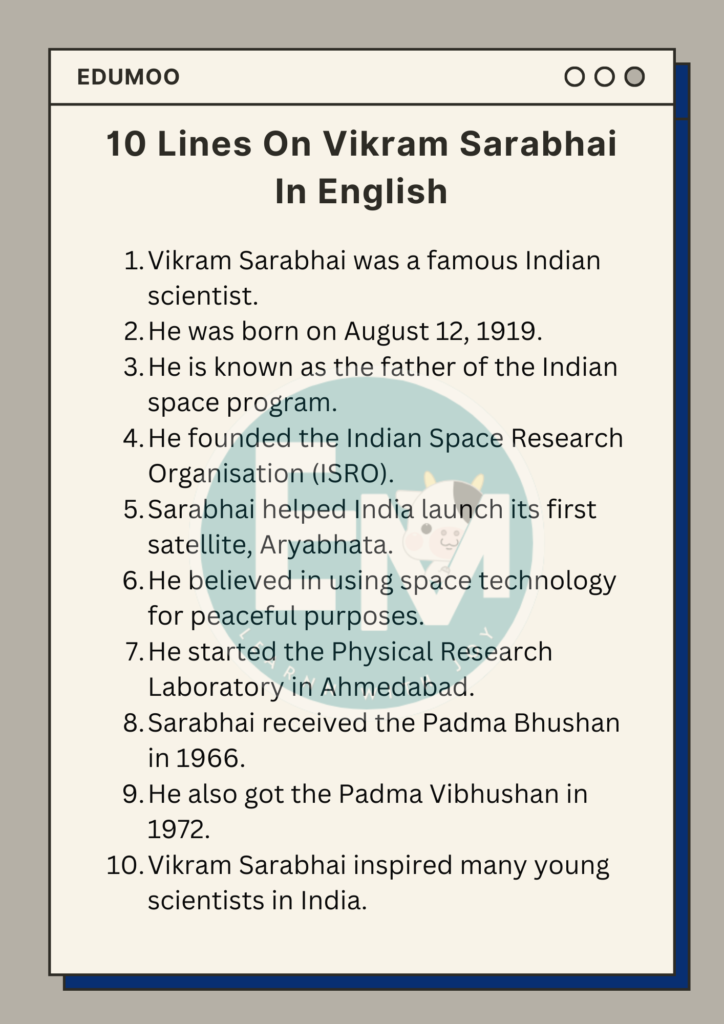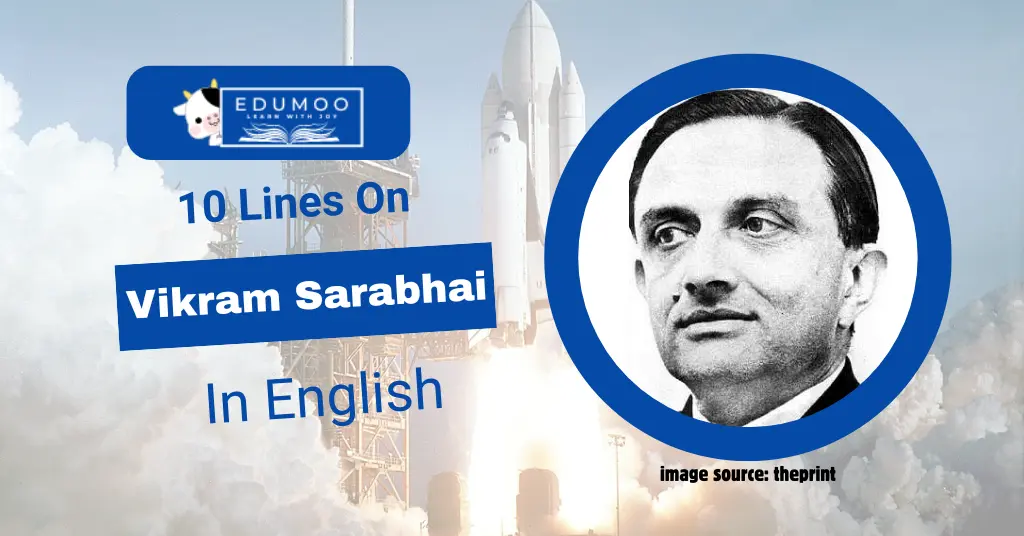Vikram Sarabhai was an amazing scientist who did many great things for India. Known as the father of the Indian space program, he played a big role in starting ISRO. He believed that space technology could help improve the lives of people. Born on August 12, 1919, he dedicated his life to science and education. Let’s learn more about this incredible person through these 10 lines On Vikram Sarabhai that highlight his important contributions.
10 Lines On Vikram Sarabhai In English
- Vikram Sarabhai was a famous Indian scientist.
- He was born on August 12, 1919.
- He is known as the father of the Indian space program.
- He founded the Indian Space Research Organisation (ISRO).
- Sarabhai helped India launch its first satellite, Aryabhata.
- He believed in using space technology for peaceful purposes.
- He started the Physical Research Laboratory in Ahmedabad.
- Sarabhai received the Padma Bhushan in 1966.
- He also got the Padma Vibhushan in 1972.
- Vikram Sarabhai inspired many young scientists in India.

Essay On Vikram Sarabhai In English In 250 Words
Vikram Sarabhai was a brilliant Indian scientist who made significant contributions to the field of space research. He was born on August 12, 1919, in Ahmedabad, Gujarat. His family was very supportive of his education and interests in science. He studied at the University of Cambridge in England and later returned to India to further his research.
Sarabhai is best known as the father of the Indian space program. He started the Indian Space Research Organisation (ISRO) in 1969. He wanted to use space technology to help people and for peaceful purposes. With his guidance, India sent its first satellite, Aryabhata, into space in 1975. This was a major milestone for the country and showed the world India’s potential in space exploration.
Besides his work with ISRO, Sarabhai established several important institutions. He founded the Physical Research Laboratory (PRL) in Ahmedabad, which became a leading center for space and atmospheric sciences. He also played a key role in setting up the Indian Institute of Management (IIM) in Ahmedabad, which is one of the top business schools in India today.
Vikram Sarabhai received many awards for his contributions to science and technology. He was honored with the Padma Bhushan in 1966 and the Padma Vibhushan in 1972, two of India’s highest civilian awards. Despite his many achievements, Sarabhai remained humble and focused on his goal of making science accessible to everyone.
Sarabhai’s dedication and hard work have left a lasting legacy. His efforts have inspired many young scientists in India to pursue careers in space research. Even after his death on December 30, 1971, his vision continues to guide ISRO and its missions.
In conclusion, Vikram Sarabhai was a pioneering scientist who made India proud with his achievements. His work has had a profound impact on the country’s scientific community and has paved the way for future advancements in space technology. His life story is a testament to the power of vision, dedication, and the pursuit of knowledge.
| Also Read: 10 Lines On Bharat Mata In English |
Essay On Vikram Sarabhai In English In 750 Words
Vikram Sarabhai was a remarkable Indian scientist who is best known as the father of the Indian space program. He was born on August 12, 1919, in Ahmedabad, Gujarat, into a wealthy and supportive family that valued education and culture. From a young age, Sarabhai showed a keen interest in science and a strong desire to learn and explore new ideas.
Sarabhai attended the Gujarat College in Ahmedabad before going to the University of Cambridge in England, where he studied natural sciences. He later completed his PhD in cosmic rays under the guidance of renowned scientist Sir C.V. Raman. This academic background laid the foundation for his future contributions to science and technology in India.
One of Vikram Sarabhai’s most significant achievements was the establishment of the Indian Space Research Organisation (ISRO) in 1969. He believed that space technology could play a vital role in addressing the challenges faced by a developing country like India. His vision was to use space technology for peaceful purposes, such as communication, weather forecasting, and resource management. Sarabhai’s leadership and vision led to the successful launch of India’s first satellite, Aryabhata, in 1975. This achievement marked India’s entry into the space age and demonstrated the country’s potential in space exploration.
In addition to his work with ISRO, Sarabhai founded the Physical Research Laboratory
Sarabhai’s contributions were not limited to space research alone. He was also instrumental in setting up several other important institutions in India. He played a key role in the establishment of the Indian Institute of Management (IIM) in Ahmedabad, which has become one of the top business schools in the country. Sarabhai also helped establish the Community Science Centre in Ahmedabad, aimed at promoting science education among young students. His dedication to education and research had a profound impact on India’s scientific and educational landscape.
Throughout his career, Sarabhai received numerous awards and honors for his contributions to science and technology. He was awarded the Padma Bhushan in 1966 and the Padma Vibhushan in 1972, two of India’s highest civilian awards. Despite these accolades, Sarabhai remained humble and focused on his mission to make science accessible and beneficial to everyone. He was known for his modesty, dedication, and commitment to his work.
Sarabhai’s vision extended beyond just scientific research; he believed in the importance of using science and technology to improve the quality of life for people. He was an advocate for the peaceful use of nuclear energy and played a role in the establishment of India’s nuclear power program. Sarabhai’s holistic approach to science and technology emphasized the need for sustainable development and social progress.
One of the most inspiring aspects of Sarabhai’s life was his ability to motivate and inspire others. He was a mentor to many young scientists and encouraged them to pursue their dreams and contribute to the nation’s progress. His leadership style was inclusive and collaborative, fostering a spirit of innovation and teamwork. Sarabhai’s emphasis on education, research, and development has left a lasting legacy that continues to inspire generations of scientists and students in India.
Sarabhai’s untimely death on December 30, 1971, was a great loss to the scientific community. However, his legacy lives on through the institutions he established and the countless individuals he inspired. ISRO, in particular, has grown into a world-class space agency, achieving numerous milestones, such as the Chandrayaan and Mangalyaan missions, which have brought global recognition to India’s space program.
In conclusion, Vikram Sarabhai was a pioneering scientist and visionary leader who played a crucial role in shaping India’s scientific and technological landscape. His contributions to space research, education, and sustainable development have had a profound impact on the country and continue to influence its progress. Sarabhai’s life story is a testament to the power of vision, dedication, and the pursuit of knowledge. His legacy serves as an inspiration for young scientists and students, reminding them of the importance of using science and technology for the betterment of society.
Vikram Sarabhai’s journey from a curious young boy to a respected scientist and leader is a remarkable example of what can be achieved through hard work, perseverance, and a commitment to making a difference. His efforts have not only advanced India’s position in the field of space research but have also laid the foundation for a brighter future for generations to come. By remembering and celebrating his contributions, we honor the legacy of a true visionary and the father of the Indian space program.
Conclusion
Today, we have learnt 10 lines on Vikram Sarabhai. Vikram Sarabhai’s work has had a lasting impact on India and the world. His efforts in developing space technology have made India a leader in this field. By learning about his life and achievements, we can be inspired to dream big and work hard. Vikram Sarabhai’s legacy continues to motivate young scientists and students across the country. Remembering his contributions helps us appreciate the power of science and innovation.

